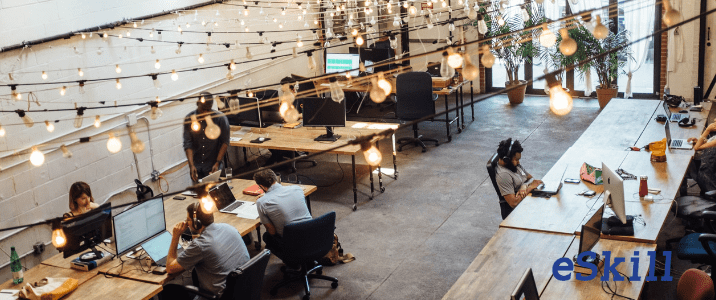
To be consistent with your business development, you need to constantly focus on growing your company and modernizing your workforce. Artificial Intelligence (AI) offers easier ways to accomplish these defined goals.
Forward-thinking businesses use AI to achieve transparency, efficiency, and creativity – all needed to survive in a trend-driven market. AI has been widely seen to be one of the important keys for growing and stabilizing a business, especially in a challenging economy.
A Good Return on Investment (ROI)
Tech Emergence summarized the results of a global survey showing that most businesses use AI to deploy automation and improve their routines – making them more efficient. When you use AI to learn more about your customers and employees, you’ll be able to increase your bottom line. About 66% of respondents said that they’re leveraging AI mainly for business process automation, which is a good place to start if you want to quickly see improvements. Ninety percent of C-level executives report that using AI has been beneficial to their company. Companies that don’t have the internal support to deploy AI technologies, yet, are rightly worried about their security and privacy. This results in continued investments in data management as they effectively devise measures to adopt AI.
Minimizing Human Error
Information Age says that AI are machines handling tasks that only humans could conduct in the past – more efficiently, conveniently, and at a much lower cost. Not only does AI provide near-continuous production (hence the rise of the 24-hour economy), but it also helps to reduce waste by providing really high-quality products and services with no human error involved. This is why factories have become so competitive – the ones with the best technology and AI keep up better with ever-growing demands. AI sustains the capability to eliminate the slightest drop in the quality of an outcome that has been the major headache of the staff members in the past.
AI-Driven Personal Relationships
CMS Wire says, “AI’s use won’t be limited to data and enterprise development only.” Experts believe that AI-powered relationship bots and voice AI business phone systems will also strengthen human relationships. AI will be able to predict things like success, trust, and other qualities that were once only observable by humans directly interacting with other humans. This is because AI can pick up on facial and vocal cues that provide you with important information. A great example of how emotion recognition with AI can benefit your business is in screening potential customer service representatives. As AI increases your efficiency in finding the best candidates to fill job openings, your HR can take on more of an administrative role.
The Human Side of AI
Those who are in the business of building business-intelligence analytics search software say that automation will simplify accessing data and make human interaction easier. However, you shouldn’t view AI as a “silver bullet” or a “magic pill” that everyone will suddenly rely on for making much more informed decisions. Even after you adopt and automate AI applications, you will still need to teach your employees about what data is available to them, how they can use the data, and how they should apply it to the work that they do.
This is why an internal “data evangelist” is critical to the successful adoption and growth of AI solutions and automation. When you hire someone to work in this role, make sure they focus on properly educating all of your employees to have a better understanding of how BI and Machine Learning (ML) work together (something that’s already happening), what was once the promise of automation is now becoming reality. Of course, this isn’t going to happen instantly. Evangelism, education, and a shared understanding of the business world will enable a smooth transition – technical expertise alone is not enough.
The Transition to Lifelong Learning
While there is a lot of excitement about the prospect of AI and machine learning, many companies simply aren’t ready for a serious level of cognitive computing. The main challenge lies in the quality of their data. Machine Learning is one of the sections of the algorithm that makes the working of a software application impeccable in delivering outcomes without being manually checked. Machine learning works in two ways – Supervised and Unsupervised. The former requires a data analyst with machine learning expertise to insert both input and coveted output, in addition to furnishing feedback about the discreteness of results during the algorithm training. The latter uses an iterative approach wherein, a deep learning is used to check the data and deliver the conclusions.
As the Machine Learning teaches a machine to learn different patterns and deliver on the basis, it lowers down the human efforts and produces large-scale results that make it highly lucrative to be adopted by most of the companies today. The increasing levels of data, cheaper computational processing, and a powerful data storage make machine learning desirable and important. A company requires data preparation capabilities, advance, and basic algorithms, automation, and iterative processes, scalability and ensemble model to create a base for a good machine learning system. By continually feeding reliable data, relevant insights and recommended actions that are generated from AI/ML your closed loop will gain additional value in the form of achieving more reliable data and making improvements on both your business processes and your customer experiences.
Integration into the Workforce
Today we’re witnessing a whole new type of working relationship between the human workforce and AI. Now that AI can communicate with employees better than in the past, we’ll see it continue to adopt even more human qualities. Eventually, AI will be seamlessly integrated into the workforce, but it will not replace human employees since there will always be a need for someone to manage and maintain AI. Instead, AI will simply make it easier for everyone to do their job. AI will also help employees be more focused and productive since they’ll no longer be bored completing menial tasks.